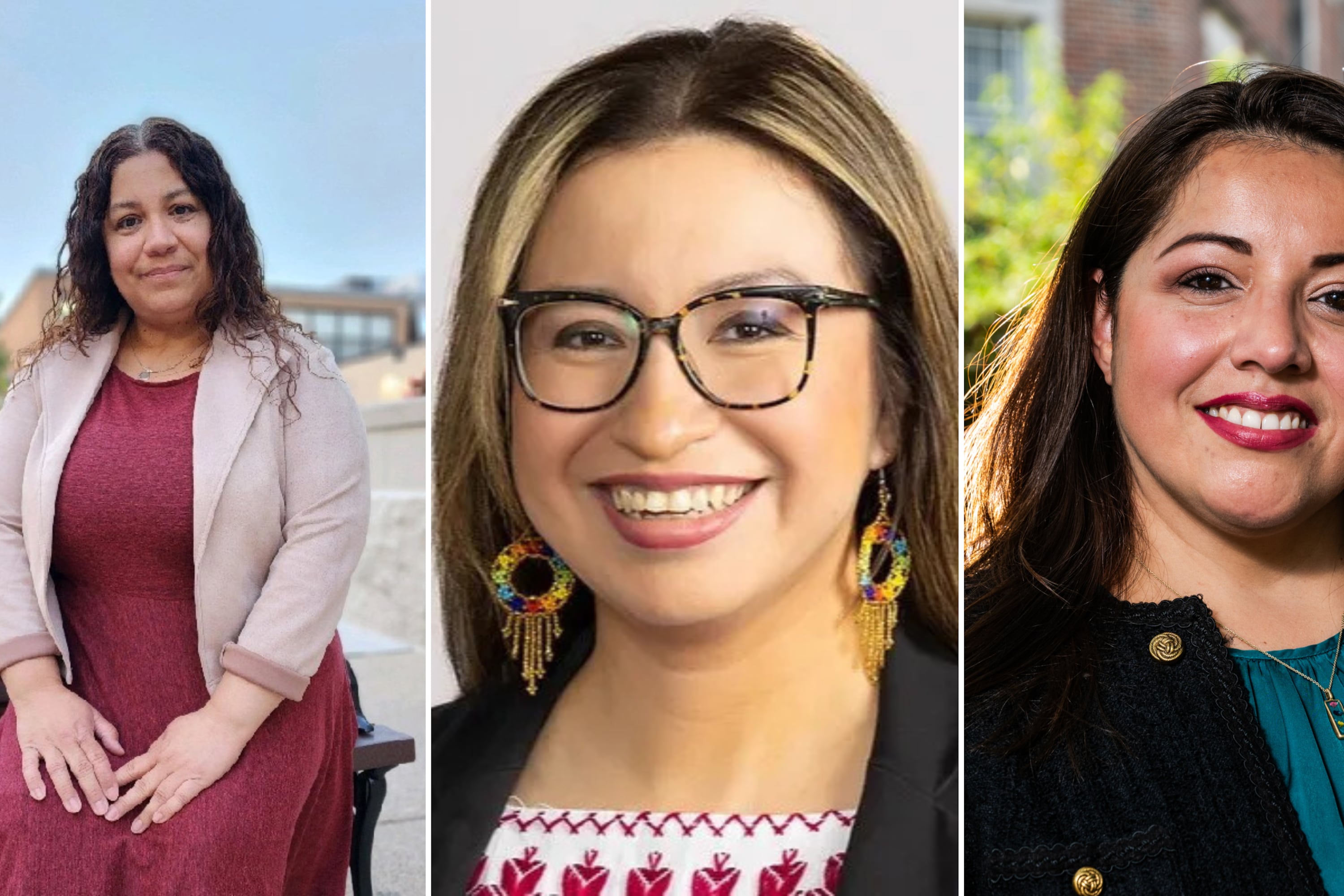Sign up for Chalkbeat Chicago’s free daily newsletter to keep up with the latest education news.
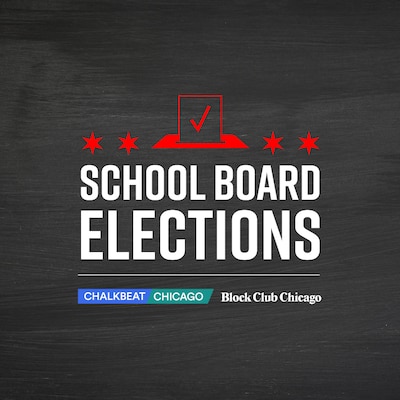
A CPS parent, a private school parent, and a state government worker are vying to represent families in District 7 on Chicago’s Southwest Side in the city’s first school board elections in November.
Raquel Don, Yesenia Lopez, and Eva A. Villalobos are on the ballot to represent the sprawling district, which includes 79 schools with 42,471 students — the largest enrollment of any school board district.
District 7 includes Pilsen, Little Village, Brighton Park, Gage Park, and the Near West Side. The district also spans portions of Bridgeport, Chinatown, McKinley Park, and Archer Heights.
District 7 mostly serves Hispanic students who make up 65% of the student body in the district, followed by Asian American students at roughly 14%. Almost 13% of students are white and only a small proportion of students are Black at roughly 7%.
The district also has the largest proportion of students receiving free and reduced lunches at 81% and the second largest proportion of bilingual students in the city at nearly 44%.
Seven schools are deemed “Exemplary” by the Illinois State Board of Education, meaning they rank in the top 10% of schools across the state. Two are magnet schools. There are three high schools identified as needing “Intensive Support,” meaning they are among the lowest performing 5% of schools in the state.
Don and Villalobos are both former accountants, while Lopez works for the Illinois Secretary of State. All attended Southwest Side schools growing up.
The trio cite varying priorities for District 7 if they are elected to the school board and have different perspectives on neighborhood schools and school choice.
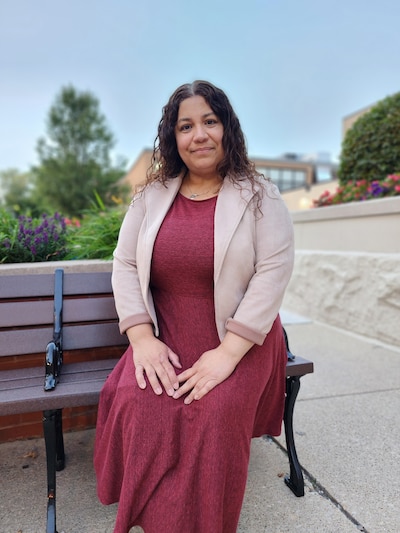
Who is Raquel Don?
Don, 49, is a CPS parent, former accountant, and Local School Council member for Jones College Prep High School, where she has served since 2014. She is also a board member for parent-run nonprofit Friends of Jones and was also an LSC member for James Ward Elementary School in Armour Square.
Don was not available for an interview by press time.
“I want to continue the work that I have been doing for over 20 years, advocating for all students’ educational needs, the critical needs of their academic facility, and their safety in general,” she said in a Chalkbeat questionnaire.
Don, originally from Chicago, lives in Armour Square with her children and husband Donald Don, who ran for alderman of the 11th Ward last year. She graduated from the now-closed Lourdes High School in Bridgeport.
Don’s top three priorities are improving achievement, improving school buildings and school safety, which she considers the most important priorities for families when selecting a school for their children.
She supports having police officers officers in schools, allowing school communities to determine what is best for their buildings.
Don does not support shifting away from selective enrollment, magnet and charter schools. School choices should not be removed without first presenting families with a better option, she said.
When it comes to CPS’ budget, she does not support annually raising the tax levy to fund school operations. The existing budget needs to be analyzed and distribution among schools needs to be reassessed, she said. Drawing from her experience as an LSC member, she has seen “how the budget causes chaos in schools when prioritizing their needs.”
Don’s campaign was self-funded as of Sept. 22. According to campaign finance filings with the Illinois State Board of Elections, she loaned her campaign $2828 on Sept. 3.
Read Don’s full questionnaire responses.
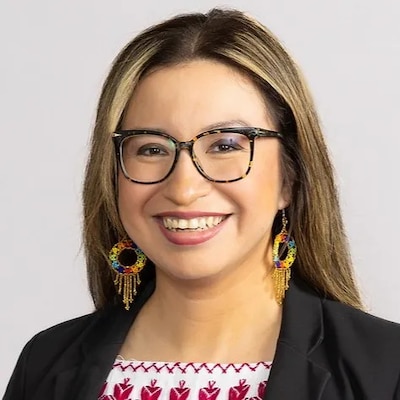
Who is Yesenia Lopez?
Lopez, 35, is an executive assistant for the Illinois Secretary of State and served as the Latino outreach director for Gov. J.B. Pritzker’s campaign. She is a graduate from DePaul University, where she studied political science and gender studies. She has served in several state and federal campaigns, including State Rep. Jesus “Chuy” Garcia, who endorsed her run for Chicago’s Board of Education.
Lopez lives in Gage Park, where she also grew up. In her early years, she also lived in Pilsen. She attended Pickard Elementary School and graduated from Benito Juarez Community Academy in Pilsen. Lopez does not have any kids.
“I am running for the historic position to empower our students, families, and community members who have long been underrepresented in educational decisions,” she said.
Lopez has no experience as a local school council member, but she has attended meetings at schools where she is involved through her work with other organizations, she said. She is on the board of the nonprofit group Telpochcalli Community Education Project, which works to support Little Village’s elementary Telpochcalli School. She is also board secretary for the Illinois Legislative Latino Caucus Foundation.
Her top three priorities are supporting neighborhood schools, improving special education, and improving bilingual education, she said.
Lopez considers bolstering dual language programs is key not only for the Hispanic and Asian American population in the district, but to “make Chicago a competitor in the globalized world,” she said. Dual language programs are essential for new arrivals and longtime families in the district, as well for all students who will join an “international and more competitive” workforce after graduating, she said.
When it comes to CPS’ budget, Lopez advocates for “working with budget and financial experts and community stakeholders to explore diverse funding solutions.” Funding should consider the needs of schools and the “economic realities” of communities, she said.
Schools should serve as “community hubs” where families and students can receive the education and services they need, including ESL and GED programs for adults, immigration assistance and other social services, she said.
“Oftentimes families in our communities, especially on the Southwest Side also need support,” she said.
The district’s new funding formula is “a step in the right direction,” yet CPS needs to continue finding local, state and federal sources of revenue to “fully invest” in neighborhood schools, she said.
Lopez supports prioritizing neighborhood schools, which are in “desperate need of revitalization.”
The COVID-19 pandemic showed the need for counselors, therapists, social workers, nurses, and family support services in schools, she said. Funding could also be used to improve special education programs, as teachers do not always have the resources and training to support students with special needs, she said.
“Our policy cannot be to abandon and forget them,” she said.
Prioritizing neighborhood schools is “not a decision to end the diversity of educational options,” she said. Closing charter schools is not one of her proposals, yet she intends to uplift neighborhood schools and ensure charters and neighborhood schools are held “to the same standard and accountability,” she said.
She is the only candidate in the district endorsed by the Chicago Teachers Union. The union supports candidates subscribing to its platform which includes “ending privatization and unionizing all school staff,” according to its website. Other priority areas for Lopez, aligned with the union’s platform, include transforming schools into sustainable community centers and addressing community needs that disrupt education.
Lopez has no cash on hand and did not receive any contributions from CTU or other donors as of June 30, according to the Illinois State Board of Elections data.
Read Lopez’s full questionnaire responses.
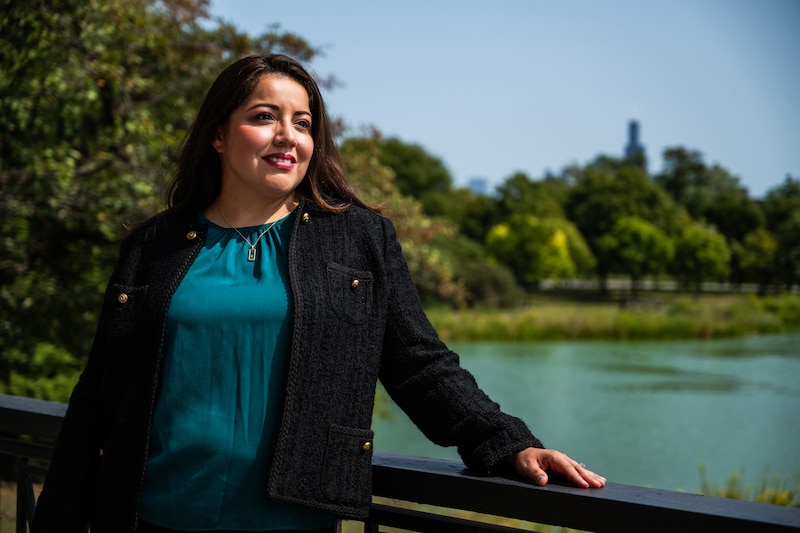
Who is Eva A. Villalobos?
Villalobos is a former accountant and private school parent of four girls. She turned to private schools when she could not find the mental health and academic support her family needed, especially for her two adopted daughters, she said. That experience led her to run for the Board of Education.
“Regardless of whether it’s a traditional public school or charter schools, students are students, and we shouldn’t be treating them any [differently],” she said.
Villalobos lives in Brighton Park with her family. She grew up in Back of the Yards and Gage Park. She attended multiple CPS schools in these neighborhoods along with her six siblings, including John M. Hamline Elementary in Back of the Yards, Armour Elementary School, and McLellan Elementary School in Bridgeport, and Englewood’s Hope College Prep in Englewood, before graduating from Curie High School.
Her top three priorities are equitable school funding, improving mental health, and improving special education, she said.
Drawing from her financial background, she proposes prioritizing a full and thorough audit of the budget before considering any increases to taxpayers.
“At a time where our schools are facing declining enrollment and underperformance, we need to take an in-depth look at how the budget is currently balanced,” she said.
Villalobos has been a vocal supporter of school choice, having used the Invest in Kids tax-credit scholarship program to send her children to private school. The credit for her oldest child allowed her to nearly halve the tuition for her kids’ Southwest Side Catholic school, she told Chalkbeat last year. Illinois let the scholarship program lapse at the end of 2023 and Villalobos said at the time it would likely force her to take her kids out of private school.
She is a strong supporter of parents’ voice in education and feels there is a “divisive narrative” when it comes to pondering neighborhood schools versus charter, magnet, and selective enrollment schools.
Families select schools based on their “needs and options,” and charter, magnet, and selective enrollment schools are very much part of the community, she said.
“One of the reasons why I’m saying we do need to listen more to our parents is they’re the ones who are facing all these headaches and trying to break down all these barriers to get the help for the kids,” she said.
Villalobos supports letting schools decide whether police officers should be in schools and providing them with the “autonomy and information” to decide how to make the school environment safe, she said.
Villalobos’ campaign had about $4,600 dollars in cash as of June 30, according to Illinois State Board of Elections filings. Her campaign received $2,500 in contributions from the Urban Center PAC, led by former CPS CEO and mayoral candidate Paul Vallas. The group supports candidates and organizations “leading a common sense community agenda.”
Read Villalobos’ full questionnaire responses.
Correction: A previous version of this article misreported that Villalobos received a $1,000 donation from public relations specialist and Pilsen community organizer Andrew Herrera. She received a $1,000 contribution from a different Andrew Herrera.
This story was published in partnership with Block Club Chicago.

